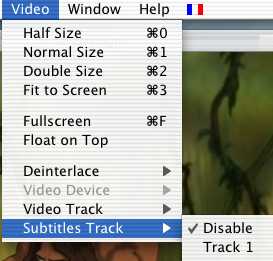Documentation:Subtitles
VLC supports many kinds of subtitles.
Media with included subtitles
Many types of media can have embedded subtitles. VLC can read subtitles for the following media formats:
- DVD
- SVCD
- OGM files
- Matroska (MKV) files
Subtitles are enabled by default in VLC media player. To disable them, go to the Video menu, and to Subtitles track. All available subtitles tracks will be listed. Select "Disable" to turn off the subtitles. Depending on the media, a description (language, for example) might be available for the track.
To disable subtitles by default, select "Preferences", then "Show All". Select "Input/Codecs". On the "Subtitle Track ID" selection window, change the value to "-1". (NOTE: Changing the value in the "Subtitle Track" menu will not disable the subtitle file.) In the case of multiple subtitle tracks, a value of "0" will enable subtitle track 1, a value of "1" will enable subtitle track 2, and so on.
VLC under Linux:
VLC under OSX:

VLC under Windows:
DVD and SVCD subtitles are merely images, so you won't be able to change anything for them. OGM and Matroska subtitles are rendered text, so you will be able to change several options.
Text rendering options can be changed in the Preferences in the Tools tab. To adjust the font preference check the All bullet in the Show Settings box, and then click Subtitles/OSD. You can then set the font and its size under Text Renderer. For the font, you have to select a font file. In Windows, they can be found in C:\Windows\Fonts. Under MacOS X, they are in /System/Library/Fonts. Sizes can be set either relatively or as a number of pixels.
Subtitle text rendering preferences under Windows, VLC 1.1.5
You need to restart your stream for the font modifications to take effect.
Subtitles files
While modern file formats like Matroska or OGM can handle subtitles directly, older formats like AVI can't. Therefore, a number of subtitles files formats have been created. You need two files: the video file and the subtitles file that only contains the text of the subtitles and timestamps.
VLC can handle these types of subtitles files:
- MicroDVD
- SubRIP
- SubViewer
- SSA
- Sami
- Vobsub (this one is quite special: it is not made from text but from images, which means that you can't change the fonts)
To open a subtitles file, use the Advanced Open dialog box (Menu File, Open file). Select your file by clicking on the Browse button. Then, check the Subtitle options checkbox and click on the "Settings" button.
You can then select the subtitles file by clicking the Browse button. You can also set a few options like character encoding, alignment and size.
An alternative is loading subtitles from the Subtitles Track menu item under the Video tab.
Note: For Vobsub subtitles, you need to select the .idx file, not the .sub file. Encoding, alignment and size won't have any effect for Vobsub subtitles.
Font can be changed as explained in the previous section.
Please read the Documentation Editing Guidelines before you edit the documentation



